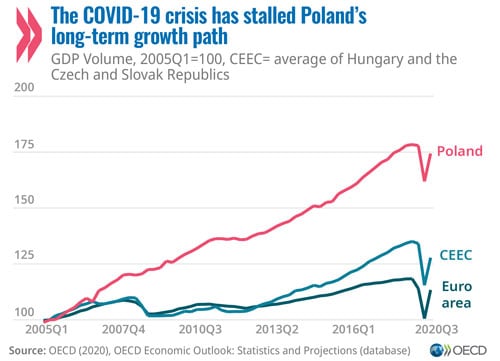Poland has suffered milder economic losses from COVID-19 than many other countries, yet the crisis still risks aggravating inequalities and reversing gains in living standards. Focusing reforms and investment on building a greener and more inclusive economy with better quality jobs will help to secure a strong and sustainable recovery, according to a new OECD report.
The latest OECD Economic Survey of Poland says that while swift government support has cushioned firms and households from the worst of the economic shock so far, the pace of recovery from the pandemic is uncertain and the recession could have more protracted consequences. In particular, the crisis has disproportionately affected weaker regions, small firms and disadvantaged workers. It also accentuated pre-existing challenges such as Poland’s ability to finance long-term pension and health spending and to overcome barriers to growth for small businesses.
“Poland will likely exit the COVID-19 crisis with fewer scars than many other countries thanks to the strength of its economy going into the crisis and its swift response with containment and support measures when the pandemic struck,” said OECD Secretary-General Angel Gurría. “Yet reforms to tackle long-standing challenges are now even more essential if Poland is to get back to the pace of gains in living standards seen in recent years.”
The Survey recommends ramping up investment in the digital economy and adult training, and making it easier for Poland’s numerous small and medium-sized enterprises (SMEs) to grow nationally and internationally so they can generate better quality jobs. Bringing forward public investment in low-carbon energy and infrastructure could give a boost to the recovery while helping to lower greenhouse emissions and air pollution. Tax reforms could also support the recovery, in particular measures to lower taxes on low-skilled workers and ease tax compliance for smaller firms.
 Prior to the pandemic, Poland’s economy was performing very strongly, with 2019 growth at 4.5% and rates of poverty and unemployment at historic lows, well below the OECD average. This followed two decades of solid growth, rising household incomes and declining inequality as Poland expanded its integration into global trade. Despite a recent resurgence of COVID-19 infections, the Survey forecasts a relatively mild drop of 3.5% in GDP for 2020 followed by a rebound of 2.9% in 2021 and 3.8% in 2022.
Prior to the pandemic, Poland’s economy was performing very strongly, with 2019 growth at 4.5% and rates of poverty and unemployment at historic lows, well below the OECD average. This followed two decades of solid growth, rising household incomes and declining inequality as Poland expanded its integration into global trade. Despite a recent resurgence of COVID-19 infections, the Survey forecasts a relatively mild drop of 3.5% in GDP for 2020 followed by a rebound of 2.9% in 2021 and 3.8% in 2022.
Yet challenges lie ahead: employment has declined, public debt has risen sharply, and the crisis will compound pre-existing problems such as inadequate provision of healthcare and housing and low labour productivity. Demographic pressures from low-fertility rates and migration outflows threaten to weigh on future growth and put pressure on pension adequacy and health budgets. Poles are retiring earlier than the OECD average, and the expected increase in life expectancy means pension replacement rates are set to shrink significantly in the absence of policy changes. Progressively aligning male and female retirement ages and raising the effective retirement age in line with increases in life expectancy would help to reduce the risk of old-age poverty, notably for women. Poland’s share of self-employed and temporary workers is well above the OECD average, and it will be vital to expand adult training to avoid low-skilled workers being left further behind in the aftermath of the crisis.
The Survey recommends that Poland find ways to support SMEs, which often have low productivity, little resilience or flexibility in the face of shocks like COVID-19, and difficulties, even in normal times, to provide high-paid, good-quality jobs. Improving the business environment, for example by reducing tax and regulatory burdens, would help SMEs to prosper and expand internationally.






